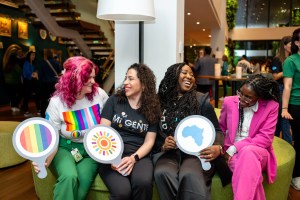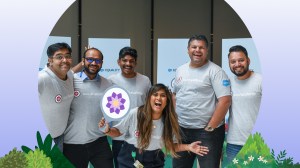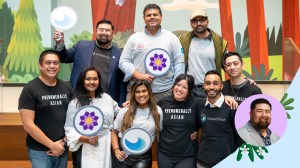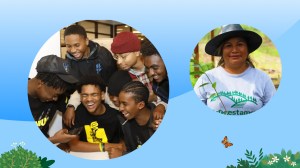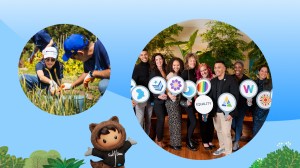Editor’s note: Data is based on 2023 operations for Salesforce (fiscal year February 1, 2023–January 31, 2024)
It’s a privilege to share this year’s update as Salesforce’s new Chief Equality Officer.
While today’s update looks back at our past – timed to our 2023 Stakeholder Impact Report – I would be remiss not to acknowledge the present, along with where we’re going. I want to take the time to recognize we are navigating extremely difficult times for the world. Many of us are processing or experiencing deep suffering and carrying this while showing up in the workplace. We continue to be committed to standing against all forms of hate, reflecting our diverse communities, and advocating for equality. This is part of why I returned to Salesforce a little over a month ago, and it’s the same reason I joined for the first time nine years ago — our unwavering commitment to equality.
At Salesforce, equality is not just a moment, a program, or an initiative — it’s our culture. Beyond being a core value, it’s how we innovate and lead. We have always been driven by the idea that the business of business is to make the world a better place. And we know when we do so, we make our company better. In this pivotal time for technology and the world, equality and inclusion are imperative. When we have diverse voices at the table, we are able to access untapped ideas, perspectives, and solutions. Especially as AI shapes every part of our lives, centering perspectives that are often on the margins will help us to create a future that is truly for everyone.
We strive to empower our employees to be visionaries and trailblazers for their communities, our company, technology, and the world. It’s how I began my career in this field and how so many others in our company and ecosystem have driven lasting impact. And over the past month it’s been wonderful to see that as the company has evolved, the Office of Equality has transformed to be more global, data-centered, and integrated into the business. In this annual update, we celebrate our continued progress, recognize where we fell short, and deepen our enduring dedication to equality for all.
Every business should be a platform for change. That’s why equality is one of our core values. We’re committed to the equality and dignity of every human being.
Marc Benioff, Chair and CEO, Salesforce
Table of Contents
- A look at where we are today
- Our future goals
- Our continued action on equal pay
- A truly global approach to equality
- A workplace where everyone can grow, thrive, and lead
- Beyond the workplace: Driving equality with our stakeholders
A look at where we are today
In 2020, the world changed in many ways. As we all worked to take care of our employees and redefine our workplace cultures during a global pandemic – society was called on to take tangible action on racial equality. That year, we set multi-year goals and commitments to advance racial equality and justice across four pillars: People, Philanthropy, Purchasing, and Policy.
The end of 2023 marked the target date for several of those goals, but it does not mark the end of our work. Over the last three years, we have taken steps to operationalize and integrate our racial equality efforts into the way that we do business. This includes transforming our supplier diversity efforts, focused strategic philanthropy commitments, engaging under-invested communities, amplifying our advocacy for more inclusive policies, and enhancing inclusive talent strategies and programs to increase access, opportunity, and belonging.
As a result:
- We exceeded all of our Purchasing goals. Since 2020, we’ve invested $195 million in companies led by underrepresented minorities (Black, Hispanic and Latinx, Indigenous, and Multiracial), and since 2021 we’ve spent more than $250 million with Black-owned businesses — far above our $100 million goal. We’ve also provided more than $410 million in payments to 735 small business suppliers through our Accelerated Pay Program.
- To date, we have donated more than $181 million and 797,000 employee volunteer hours to nonprofit organizations advancing racial equality and justice – on track to hit our targets of $200 million and 1 million hours by the end of 2025.
- We reached our first public goal of 50% of the U.S workplace identifying as an underrepresented group (women, Black, Hispanic and Latinx, Indigenous, Multiracial, LGBTQ+, veteran, or people with disabilities) in 2022, earlier than planned.
- And, we achieved our goal of doubling Black representation at the VP and higher levels by the end of 2023.
Where we need to focus
- Since 2020, our company, the industry, and the world have experienced critical shifts. Rapid hiring and growth allowed companies to increase representation more rapidly. Last year, many companies pivoted to profitable growth mode from growth at all costs. We’ve revised our hiring strategy to be in line with our profitable growth strategy.
- So while we achieved two of our public representation goals, we fell short of our goals to increase underrepresented minority employees overall and in leadership by 50%. We are doubling down on increasing representation, holding ourselves accountable by regularly reviewing progress and setting annual targets.
- Similarly, progress slowed on gender representation, resulting in slightly (.1%) less progress compared to the previous year, with an additional focus needed on the leadership levels. We have seen a bright spot in women’s representation at the SVP and higher levels, which increased by 5 percentage points — from 25% to 30% — since 2022.
See a snapshot of our data below, and dig into the interactive visualization here.
Our future goals
As we said, the work doesn’t end. We will continue to push ourselves to build a workplace that reflects society and set thoughtful goals that drive progress while holding ourselves accountable. We know that we need increased and continued focus on women and URM representation – overall and at the leadership level. We also recognize that, as our company and industry evolve, we need to be more expansive in how we look at leadership and take a longer view. Here are our new 2030 goals:
Our continued action on equal pay
Since the company’s first equal pay assessment and adjustment nine years ago, we have continued our annual process to get closer to equal pay for equal work. Over the years, our assessment has evolved to include additional categories, and this year we added adjusted pay ratios across gender and race to our reporting.
In 2024, our equal pay assessment resulted in 3% of our employees receiving an adjustment. After making adjustments where needed, employees performing similar jobs were paid on par across all genders globally and all races and ethnicities in the U.S.
Gender balance and inclusivity are essential for innovation, customer success, and employee satisfaction.
Arundhati Bhattacharya, CEO and Chairperson, Salesforce India
A truly global approach to equality
In addition to our global efforts to close the gender pay gap, we know that having a holistic global strategy is vital in today’s interconnected world, especially in the regions where our business is growing. We are striving to ensure that inclusivity resonates in every corner of the world. Last year, we expanded our equality team to India and Latin America to develop equality strategies in our growing business markets. And in EMEA, we launched an Equality Board of executive leaders leading the way on inclusion and representation in the region.
Global gender equality
This global focus also shows up in our work to advance gender equality in our company and in society broadly. To that end, in 2023, we made new commitments at the UN General Assembly to support greater women’s representation in tech, science, and financing and to help advance equal pay around the world.
While our goals are global, our approach is local. Recognizing that women leaving the tech industry is a challenge in India, we’ve launched key programs including our India-based Return to Work program, which brings women with technical skills back into the workforce.
We also successfully launched leadership development programs across key regions such as India, Latin America, the U.S., and EMEA, and including underrepresented participants, to build their networks and careers. We have seen incredible program outcomes for those who’ve participated, with our global employee survey showing a 9% average increase among participants in feeling empowered to continue their career development at Salesforce.
In addition to supporting our employees’ development all around the world, we also continue to build a more diverse talent community, including hosting summits in Tokyo, London, and Hyderabad, India, focused on increasing gender diversity in our hiring pools. We’re also cultivating executive talent from underrepresented groups through partnerships with the Hispanic Tech Executive Council and the Executive Leadership Council, for example. Our Insiders Program, which connects potential candidates with employees who have shared experiences or backgrounds, has supported more than 2,000 connections in 2023.
A workplace where everyone can grow, thrive, and lead
At Salesforce, we are creating a culture where everyone can grow and thrive. It’s important that we don’t just focus on hiring, but that we prioritize retention, mobility, and belonging. We want to empower our employees with the tools they need to become the next company and industry leaders.
Equality is critical to strengthening our culture, building inclusive teams, and delivering the best for our customers.
Nathalie Scardino, President and Chief People Officer
And we’re seeing positive signs of progress: In our most recent global employee survey, we’re seeing strong favorability across items in the Inclusion Index, including “My manager promotes an inclusive work environment” and “I feel encouraged to live our value of equality at work.” We have multiple key programs, outlined below, that support inclusion and belonging.
The Warmline
Our employee advocacy program for underrepresented groups connects employees to advocates to help with pivotal career moments and conversations. Since the program’s inception in 2020, we’ve seen an 80% decrease in attrition among employees who have worked with the Warmline. This is one of the many reasons the program was named a Diversity, Equity, and Inclusion Lighthouse by the World Economic Forum in 2023.
Mentorship and Sponsorship
We continue to focus on mentorship, sponsorship, and career navigation programs, which are key to our efforts to address the needs of our employees while demonstrating measurable impact on inclusion.
Black Women’s Experience
This program has supported greater access to career development opportunities, manager support, and mentorship for Black women at the company. Last year we held a series of events for Black women employees focused on AI skill-building, business strategy, and career development. We continue to work to address what research shows — that Black women often have differing experiences in the workplace compared to their counterparts. We are using what we’ve learned from this program to build best practices to support other marginalized communities.
Equality Groups
Our Equality Groups, one of the longest-standing equality programs at Salesforce, are instrumental to the experience of our employees. Nearly 60% of the workforce is a member of one or more of our 13 Equality Groups, or employee-led resource groups. The culture work that Equality Group leaders do is critical to both community-building and putting equality at the center of how our business operates. A few highlights:
- Our Parents and Families Equality Group helped support the development of more robust caregiving benefits, including for elder adult caregiving.
- UK leaders of Faithforce, our interbelief Equality Group, helped create a policy for floating holidays to allow employees to use their holidays in ways that are most meaningful for them.
- Latinoforce, our Equality Group for Hispanic and Latinx employees and allies, partnered with the Trailhead team to make it simpler for learners to take courses in Portuguese and Spanish.
- Our Equality Group leaders meet regularly with customers to share best practices that have helped Salesforce deliver impact for equality and the business.
Reflecting our diverse communities through Self ID
We know that to push ourselves further, and better serve our employees, we need to more fully understand the various aspects of their identities. This year, we plan to expand our Self-ID program outside the Americas to help us design and implement more inclusive strategies. Here is where our U.S. Self ID representation for our additional underrepresented groups stands:
This data is key in our efforts to offer personalized benefits, programs, and support for our various communities — including veterans, LGBTQ+ employees, and people with disabilities.
- Disability inclusion: Our Office of Accessibility continues to drive greater disability inclusion, for example, through resources on Trailhead and the Workforce Navigators website, which highlights the support for professionals with disabilities interested in careers in the Salesforce ecosystem. We’re proud to have received a score of 100 on the Disability Equality Index for the fifth consecutive year. This recognition earned us a spot on the Best Places to Work for People with Disabilities list.
- Strategic LGBTQ+ partnerships: We’ve launched workshops and trainings in partnership with Outforce, our Equality Group for LGBTQ+ employees and allies, alongside the Human Rights Campaign and global organizations focused on this community.
- Military hiring and veteran benefits: In 2023 we launched our Skillbridge Fellowship Program for members of the military who are transitioning to civilian roles. We reached our goal of 47 fellows placed in less than a year. Our use of Self ID also helped us ensure that all employees who are active military maintain their paychecks and benefits when they are deployed.
Beyond the workplace: Driving equality with our stakeholders
We can’t do this work in isolation. We partner with employees, partners, customers, and Trailblazers to multiply the impact of what we’re doing — so this work benefits our employees and our communities, our ecosystem, and greater society as well.
Closing the wealth gap
To support the economic empowerment of underrepresented communities, we’ve focused on building more inclusive supplier diversity strategies. This includes launching our Supplier Diversity Academy, a six-month accelerator program for small businesses that are owned by underrepresented minorities, women, veterans, disabled, or LGBTQ+ individuals. And, we’ve provided hands-on support for 50 Black-owned businesses by way of mentorship and sponsorship programs focused on business development. In 2024, we’re also gearing up for the launch of a new initiative — a mentorship and sponsorship program tailored to support Hispanic and Latinx-owned businesses.
Seeking climate justice
Our 10-year, $100 million commitment to advancing climate justice has also made a great impact to date, with $14 million deployed in less than three years.
Investing in nonprofits with underrepresented leaders
Our philanthropic impact goes beyond the numbers. We have also revamped our practices, including through the Salesforce Foundation’s Catalyst Fund, which invests in younger, smaller nonprofits with underrepresented leaders.
Supporting systemic change through advocacy
In our public policy work, we’ve continued to address vital issues, from LGBTQ+ rights to nonpartisan voter engagement. For example, in the U.S., we’ve encouraged legislative action by championing the Respect for Marriage Act, advocating for the protection of voting rights, and promoting paid family leave laws.
Our policy work has also allowed us to think more globally about how we deliver equality impact. In Australia, we launched a Reconciliation Action Plan, which outlines our continued commitment, respect for, and relationship-building opportunities with Aboriginal and Torres Strait Islander people and communities. This year we are renewing our plan at the “elevate” level – the highest level – demonstrating our active championing. We’ve also expanded our nonpartisan civic engagement program into international markets, such as India and Spain, to support employees in being active citizens wherever they live.
Building strategic equality partnerships
In 2023, we also established or expanded strategic partnerships with trailblazing organizations working to advance equality, including the Human Rights Campaign, We Are All Human, National Urban League, Out & Equal, and Black Women on Boards.
Engaging the Salesforce Partner Ecosystem
Our partner ecosystem of more than 11,000 partners continues to be a critical lever for us to advance diversity, equity, and inclusion in collaboration with partner businesses who not only use and champion Salesforce products but have also committed to making the world a more equal place.
Putting equality at the center of AI
Our AI for Impact Accelerator initiative aims to enable equitable use of trusted generative AI, allocating $2 million to six nonprofit organizations, along with a donated 24-month contract for Salesforce products, six months of intensive coaching, and 12 months of exclusive one-on-one consulting from Salesforce pro bono volunteers.
***
Our public equality update is an important moment for reflection, transparency, and accountability. At the same time, to reach equality in our workplace and society, it takes intentional and consistent action from all of us. When we do this well, we are able to access untapped ideas, perspectives, and solutions — positioning us to lead in innovation, the future of AI, and beyond. I’m looking forward to partnering with our customers, partners, and so many in our broader community as we work together to drive equality for all.
Learn more about our commitment to Equality and Racial Equality and Justice.
See our archive of Annual Equality Updates: 2023 | 2022 | 2021 | 2020 | 2019 | 2018 | 2017
